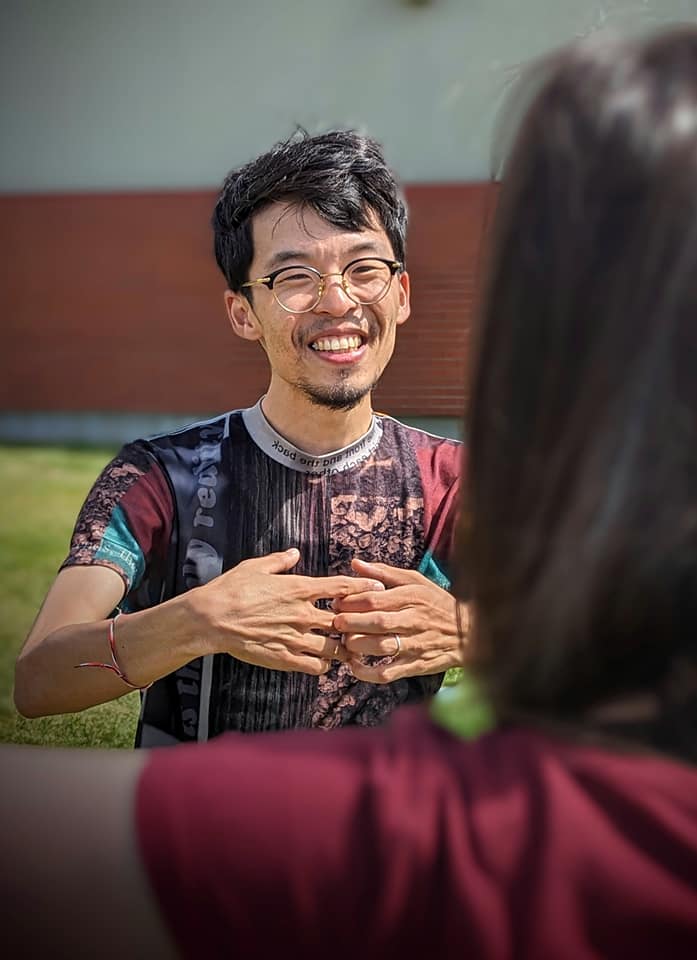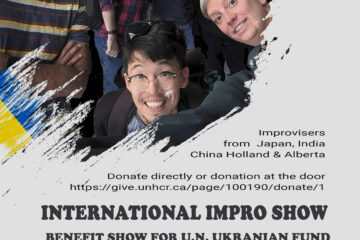THOUGHTS, IDEAS, QUESTIONS, PROCESS, LESSONS,
Student Post
Oshow – The Final Entry!
OSHOW – Week 9
“(original Japanese below. Translation by ChatGPT)
Final Week After finishing Maestro at Loose Moose yesterday, all my activities in Calgary have come to an end.
In the final show, I didn’t become a Maestro (eliminated in the first round), but it became the show I was personally most satisfied with because I was able to let out what had welled up inside me without holding back.
When I came to Loose Moose five years ago, I saw Steve covering everything needed in the moment and thought I wanted to become an improviser like that. Now, five years later, I think I might have come a little closer to standing on the same stage as Steve again.
 On the last day of rehearsal, Shawn gave us a modest gift. Among them, the certificate of completion had these words written on it:
On the last day of rehearsal, Shawn gave us a modest gift. Among them, the certificate of completion had these words written on it:
“Improvisation is not the destination. It is a lifelong process of learning, acting, and curiosity-filled exploration.”
In other words, our journey is not over yet. The end of this journey leads to the beginning of the next. It will continue as long as we don’t say “Scene.” Pursuing risks and, if they are intriguing, the never-ending story will continue.
Rather than getting too poetic and sentimental, I think it’s better to write specific things from here on. I will write about what has changed in the last two months.
What I have learned in these two months can be summarized as “Keith’s Improv 2.0.” Keith Johnston constantly updated his philosophical thoughts and never systematized or methodized them. Unfortunately, Keith passed away in March of this year, leaving behind only a few books as a solid legacy.
However, he left behind an uncertain legacy. The improvisers and leaders around the world who received his guidance are still performing around the world, continuously updating their learning from him. Shawn Kinley is undoubtedly one of them, running at the forefront.
The improvisation he conveys is an evolution of Keith’s improvisational thinking, and it repeatedly updates my previous thoughts. And at its core was “taking risks.”
The word “risk” is something improvisers hear so much that they can become deaf to it. But whether we can really practice it is another matter. We tend to stick to “familiar risks” if we let our guard down. We end up wandering around the periphery of failures that are less damaging. And this is something we often can’t notice by ourselves. Shawn pointed out my weaknesses directly and helped me improve. When I return to Japan, I might fall into a different pattern, but his words of “break the pattern” that he constantly asked me will undoubtedly help me crawl out of the mud.
And this is also a significant change as a leader. Shawn always told me whenever he felt even a slight discomfort. Of course, there were times when he didn’t say it deliberately, but if I asked, he would always answer, and he remembered everything. Pointing out your weaknesses may not be a pleasant thing, but Shawn communicated it accurately and specifically, so I could trust that he was “really watching.” I had never pointed out as much as a leader before. I wasn’t unaware of it, but I was holding back somewhere. Out of fear of hurting others or the fear of being wrong. But I realized that it was unnecessary. Of course, it’s important whether the person is ready to receive it, but trusting that, jumping in, or in other words, “taking risks” is also important for leaders.
What he says is always filled with confidence and conviction. Saying “this is it!” is scary, and I’ve had doubts that it contradicts the uncertainty of improv. But thinking about how Keith always confidently said “this is it!” and then the next day he would say the opposite, I realized that this “uncertainty” is not something that arises within me. Always walk the path with courage, but if you realize you’re wrong, take a different path, and then another… you don’t know where you’ll end up. This is the true “uncertainty” of improv, as I mentioned earlier. It’s not about the destination; it’s about the process.
I experienced in the past two months that this back and forth is the journey of learning improv. And it’s important to firmly step on that path. But at the same time, don’t forget to change flexibly.
In the world of Zen, there is a word called “Kinhin” (walking meditation). Dogen Zenji taught the essence of Zazen as “shikan taza” (just sitting), but the essence of Kinhin is “hitasura aruke” (just walking).
Kinhin is walking beyond walking, walking that is liberated from everything, in other words, throwing oneself into the world of pure walking.
And Kinhin is achieved by three types of walking: solitary walking, quiet walking, and complete walking.
Solitary walking is literally walking alone. Its spirit is “not competing.” It’s about walking your own walk without being controlled by others, walking autonomously.
Quiet walking is walking without hurry, without forcing, walking while calming the mind and body. Its spirit is “not exerting force.” You get tired from walking. Your feet hurt. You face difficulties and walk through them in silence, slowly.
Complete walking is continuing to walk. Its spirit is “not giving up.” What you couldn’t do today, aim for tomorrow. There is no completion in walking. So, as long as you can, keep walking.
 Kinhin is philosophy, not form. It’s a dojo where everything is open to everyone, with a place to tread on the ground. The walking distance doesn’t matter, long or short. Where and how to walk is free. This freedom is the essence of Kinhin. If you have the will, you can do Zen practice anytime, anywhere, for anyone, and that’s Kinhin.
Kinhin is philosophy, not form. It’s a dojo where everything is open to everyone, with a place to tread on the ground. The walking distance doesn’t matter, long or short. Where and how to walk is free. This freedom is the essence of Kinhin. If you have the will, you can do Zen practice anytime, anywhere, for anyone, and that’s Kinhin.
The journey of improv is like Kinhin. With just yourself, you can practice anytime, anywhere, and it never ends. Keep walking as long as you can. From Canada to Japan and then to the world.




0 Comments